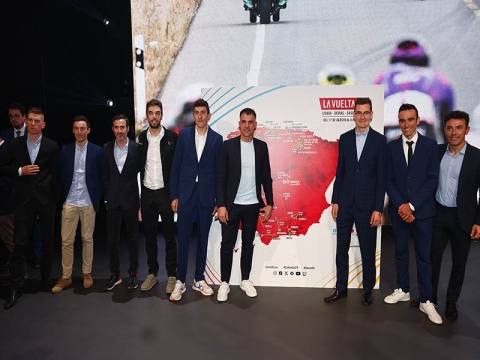Sports
Presentation of the stages of La Vuelta España 2024
21 stages through Portugal and Spain
Tour of the Cycling Tour of Spain 202 (Source: ©Unipublic)
The Madrid Marriott Auditorium Hotel was the setting chosen by Unipublic to present, together with RTVE, yesterday, Tuesday, December 19, the route of the seventy-ninth edition of the Vuelta Ciclista a España 2024, which will start in Portugal on August 17 and will conclude on September 8 in the traditional Plaza de Cibeles in Madrid.
During its 21 stages, it will have 10 departures and 6 unprecedented goals, it will visit 9 autonomous communities and two countries: Portugal and Spain. In sports, the cyclists will face 9 high finishes; 2 individual time trials; 5 medium mountain stages; 8 mountain stages, and 6 flat or undulating stages.
For the second time in history the Vuelta a España will begin in the Portuguese country, specifically in Lisbon with an individual time trial, just as it did in 1997, to continue through Oeiras, Cascais and Lousã as great hosts of the first stages.
Once the three stages through Portugal have finished, the Vuelta a España will enter Extremadura territory where it will host a full mountain stage in Cáceres, between Plasencia and Pico Villuercas. The next day, the race will depart from Fuente del Maestre, in Badajoz, to head south, with Seville as the first destination.
Once the three stages through Portugal have finished, the Vuelta a España will enter Extremadura territory where it will host a full mountain stage in Cáceres, between Plasencia and Pico Villuercas. The next day, the race will depart from Fuente del Maestre, in Badajoz, to head south, with Seville as the first destination.
Andalusia will once again be one of the main protagonists of the Spanish round with four integral stages in the community: Carrefour Sur. Jerez de la Frontera, mid-mountain stage and high finish; Archidona and Córdoba; Úbeda and Cazorla, half a mountain and a high end; and to conclude the Andalusian journey, Motril and Granada, a high mountain stage with three first-class ports.
At the end of the first week of the race, the Vuelta a España will head to the north of the Iberian Peninsula, specifically to Galicia, to face the second week of competition where the mountains will be the protagonist: Ponteareas and Baiona, mountain stage; Cortizo Technological Campus, in Padrón, will be the departure and arrival with half a mountain; Ourense and Manzaneda Mountain Station, high end; and Lugo and Puerto de Ancares, mountain and high finish, will be the Galician stages to then enter Castilla y León: Villafranca del Bierzo and Villablino, mid-mountain; Infiesto and Pajares (Cuitu Negru), mountain and high finish. These are the stages of the second week of the race.
The third week of the race will begin in the north, with Asturias and Cantabria as the protagonists. After the second day of rest, the last week of La Vuelta will depart from Luanco and conclude in the Lakes of Covadonga, mountain and high finish; Arnuero and Santander, mid-mountain; Vitoria and Izki Natural Park, mid-mountain; Logroño and Alto de Moncalvillo, high finish; and Villarcayo and Picón Blanco, high mountains and high finish.
One more year, Madrid will host the final party of La Vuelta; this time, with a time trial stage that will start from Distrito Telefónica and conclude on Gran Vía in Madrid, at the height of the Telefónica building, as a tribute to the company's 100 years of history.
One more year, Madrid will host the final party of La Vuelta; this time, with a time trial stage that will start from Distrito Telefónica and conclude on Gran Vía in Madrid, at the height of the Telefónica building, as a tribute to the company's 100 years of history.
more information: https://metavolante.es/
Liability for this article lies with the author, who also holds the copyright. Editorial content from USPA may be quoted on other websites as long as the quote comprises no more than 5% of the entire text, is marked as such and the source is named (via hyperlink).






